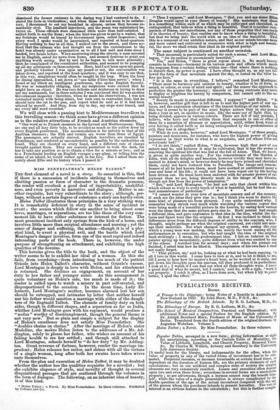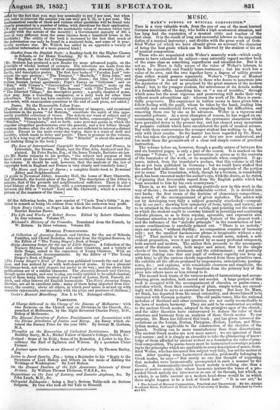PUBLICATIONS RECEIVED.
Books.
A Tramp to the Diggings; being Notes of a Ramble in Australia and New Zealand in 1852. By ,robn Shaw, M.D., F.G.S., 8re.
The Ethnology of the British Islands. By R. G. Latham, M.D., &e.
The Ethnology of Europe. By R G. Latham, M.D., 8rc. The School of Musical Composition, Practical and Theoretical ; with additional Notes and a special Preface for the English edition. By Dr. Adolph Bernhard Marx, Professor of Music at the University Of Berlin. Translated from the fourth edition of the original German, by Augustus Wehrhan. Volume I.
Helen Talbot; a Novel. By Miss Pennefather. In three volumes.
Popular Tables, arranged in a new form ; giving Information at eight for ascertaining, according to the Carlisle Table of Mortality, the Value of Lifehold, Leasehold, and Church Property, Renewal Fines, &a. By Charles M. Willich, Actuary and Secretary to the University Life Assurance Society. [A useful book for the library, and indispensable for the office, when the value of _property in any of the varied forms of investment has to be esti- mated. Perpetual incomes, or incomes terminable at certain fixed tunes, or dependent on the duration of human life, are the primary elements of such calculations ; but in our artificial and complex state of society the simpler elements are very extensively ramified. Leases and annuities often depend upon two and even three lives ; reversions in several forms are a marketable property ; so are advowsons, though a layman cannot reap the benefit him- self; while the value of a single presentation is always complicated by the double question of the age of the actual incumbent compared with the age of the person whom the purchaser intends to present hereafter. The rate ef interest is an obvious feature in the calculation ; but this is further oomph- ca d by the fact that you may buy nominally to pay 5 per cent, but when you come to reinvest the surplus you can only get 3, 3, or 4 per cent. The mathematical results of these and various other questions will be found very clearly presented in a number of tables, with directions for their application. (We say mathematical, because the marketable value of incomes vanes very greatly with the nature of the security ; a Government annuity of 60/. a year is very different from the same income from a leasehold house in the outskirts.) The utility of the book is increased by the fact that much of the information can only be found in a scattered form, and some of it prac- tically nowhere else. Mr. Willich has added in an appendix a variety of statistical information of a more general kind.] Studies from the English Poets: a Reading-book for the Higher Classes in Schools, or for Home Teaching. By G. F. Graham, Author of "English, or the Art of Composition." [Mr. Graham has produced a new Reader for more advanced pupils, on the principle of wholes instead of extracts. His selections are made from the greatest poets, and in varied kinds of composition—epic, dramatic, lyric, di- dactic, and descriptive poetry. The first four books of " Paradise Lost" con- stitute the epic portion ; "'The Tempest," "Macbeth," "King John," and "The Merchant of Venice," represent the drama ; the Odes of Gray and Collins furnish lyrical specimens ; Pope's Essays on " Criticism " and on "Man," with Cowper's Conversation" and "Retirement," make uc the. didactic part ; "Winter," from "The Seasons," with "The Traveller' and 'The Deserted Village," the descriptive poetry : a goodly chaplet-of gems that may form a travelling companion, or a daily book for other than- schoolboys. The text has been carefully expurgated ; and brief explanatory. foot-notes, with examination-questions at the end of each piece, are added.] Poems. By the Honourable Julian Fane. [Facility of diction, a flow of verse, a sufficiency of imagery, and occasional tenderness in the poems "Ad Matrem," constitute the merit of this appa- rently youthful collection of verses. The defects are want of subject and of treatment. Stanzas to half-a-dozen different ladies, commonplace "Songs," "Similes," " Complaints," and so forth, some personal poems in which the singular altogether predominates over the general, and a few loftier though common themes after the style of Byron, are riot sufficient to interest a distant reader. Except in the more every-day topics, there is a want of drift and lucidity, which tends to delay and puzzle. There is promise in the volume, but it is a long way off performance. The "Brindisi' is about the most real and dashing thing in the book.] The Law of International Copyright between England and France, in Literature, the Drama Music, and the Fine Arts, Analyzed and Ex- plained. By Peter Burke, Esq., of the Inner Temple, Barrister-at-law. [As Mr. Burke remarks in his preface, "the subject and purpose of this small work speak for themselves" ; the title succinctly states the contents of the volume. It should be said, however, that the analysis of the law of copyright both in England and France is very clearly and concisely done.] The Home and Grave of Byron ; a complete Guide-book to Newstead Abbey and Neighbourhood. [A guide to Newstead Abbey, Annesley Hall, the home of Mary Chaworth, and Hueknell, the burial-place of the poet. The description of the Abbey is minute, that of the grounds and neighbourhood sufficient There is also a brief history of the Byron family, with a contemporary account of the duel between the fifth or "wicked" Lord and Mr. Chaworth ; which is a curious picture of the manners of the times.] Of the following books, the new reprint of "Uncle Tom's Cabin" is en- titled to remark as being the edition from which the authoress may prat. Uncle Tom's Cabin, or Negro Life in the Slave States of America. By Harriet Beecher Stowe.
The Life and Works of _Robert Burns. Edited by Robert Chambers. In four volumes. Volume IV.
_Michaud's History of the Crusades. Translated from the French, by W. Robson. In three volumes. Volume III.
MUSICAL PUBLICATIONS.
A Collection of Amusing Rounds and Catches, for the use of Schools, Families, and Choral Societies. Selected from the Original Sources, by the Editor of "The Young Singer's Book of Songs." Sixty Amusing Songs for the use of Little Singers. A Collection of the Nursery Rhymes of England and other Countries, and a variety of little Songs, suited to the capacities of Young Children. With an easy Pianoforte Accompaniment. By the Editor of "The Young Singer's Book of Songs." [The Young Singer's Book of Songs was published towards the end of last year, and was noticed by UR with well-deserved praise. It was a pleasant Christmas-book, not only elegant but useful in its way, and the above little publications are of a similar character. The Amusing Bounds and Catches, though quite simple, and easy to sing, are really entitled to be called classical, most of them being little musical jeux d'esprit of Lewes, Byrd, Purcell, Al- drich, and other famous old English harmonists. The Sixty _Amusing Songs, likewise, are all in excellent taste ; many of them being imported from Ger- many, the country, above all others, in which good music is mixed up with domestic enjoyments, and especially with the plays and pastimes of children.] Cocks's Musical Miscellany. Nos. L to VI. Enlarged edition.
PAXPHINI13.
A Charge delivered to the Clergy of the _Diocese of Melbourne: with two Sermons on the Church and on Divisions in the Church, &c., preached at Melbourne, by the Right Reverend Charles Perry, D.D., Bishop of Melbourne.
The Eternal Duration of Future Punishments not Inconsistent with the Divine Attributes of Justice and Mercy. An Essay which ob- tained the Burney Prize for the year 1861. By George M. Gorham, M.A.
Thoughts on the Renovation of Cathedral Institutions. By Henry Boothby Barry, M.A., Michel Fellow of Queen's College, Oxford, &c. Ireland : Some of its Evils Some of its Remedies. A Letter to his Ex- cellency the Earl of Egluiton and Winton. By a quondam Ulster Farmer.
A Lecture upon Cotton as an Element of Industry. By Thomas Baxley, Esq.
Letter to Jared Sparks, Esq.; being a Rejoinder to his "Reply to the Strictures of Lord Mahon and Others on the mode of Editing the Writings of Washington." By Lord Mahon.
On the Present Position of the Life Assurance Interests of Great Britain. By William Thomas Thomson, F.R.S.E., &c.
Suggestions on the Law of Lunacy, and _Lunatic Asylums, 8re. By John Leech, 11.D., &c.
Colloquial Soliloquies ; being a Day's Serious Table-talk on Serious Subjects. By One who took all the Talk to Himself.



























 Previous page
Previous page